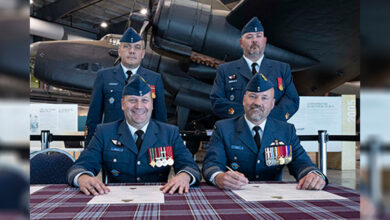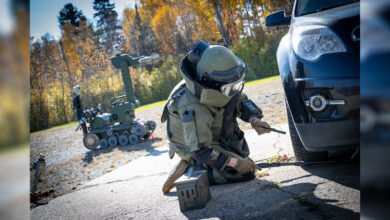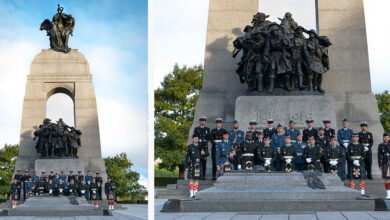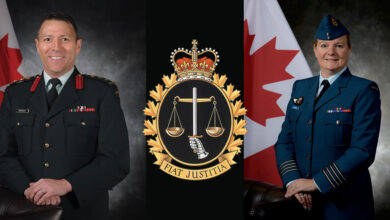Duty CallsUncategorized
Gone But Not Forgotten – Rick Hillier
By Patrick Twomey
“GONE BUT NOT FORGOTTEN” is certainly a phrase that comes to mind when people in the military community think of former Chief of Defence Staff Gen (Ret’d) Rick Hillier. Largely credited as the architect of the renaissance of the Canadian Forces he still casts a large shadow over debates and discussions of the Canadian military. These debates largely focus on military or foreign affairs issues, but what is less commonly known is the great impact he has had in the way military families are perceived and treated both by the military and the larger Canadian community.
 I recently had the privilege to sit down with Gen Hillier in his downtown Ottawa office within site of his former digs at National Defence Headquarters. It was an excellent opportunity to get his perspective on the changes to the perceptions of military families over his long career, and particularly over the last ten years. When asked to give a quick synopsis of his family life throughout his career the first descriptor he came up with was “tumultuous.” Early on in his career there were many moves, more so than usually found in the CF today and he and his wife Joyce found themselves moving to different bases, provinces, and even out of the country with postings to Germany and the United States. One of the constants throughout his career was Joyce, whom he met at high school in St. John’s, Newfoundland, and the home she created wherever the Canadian Forces took them. As he recalled the early years of his career, which began in 1973 and through the eighties, were marked by the attitude that “if the army had wanted a soldier to have a family they would have issued you with one.” As he put it, the attitude was that “if you could not look after your family, you weren’t capable of being a leader in the Canadian Forces.” That is to say that family strife or stress was due to personal failure rather than “the stresses and strains of all the things [the CF] asked people to do.” This belief was backed up when Hillier recalls the birth of the family’s second son Steven. He was born in Germany and at that time Hillier was allowed to attend the birth, but then was promptly re-deployed with his regiment on an exercise.
I recently had the privilege to sit down with Gen Hillier in his downtown Ottawa office within site of his former digs at National Defence Headquarters. It was an excellent opportunity to get his perspective on the changes to the perceptions of military families over his long career, and particularly over the last ten years. When asked to give a quick synopsis of his family life throughout his career the first descriptor he came up with was “tumultuous.” Early on in his career there were many moves, more so than usually found in the CF today and he and his wife Joyce found themselves moving to different bases, provinces, and even out of the country with postings to Germany and the United States. One of the constants throughout his career was Joyce, whom he met at high school in St. John’s, Newfoundland, and the home she created wherever the Canadian Forces took them. As he recalled the early years of his career, which began in 1973 and through the eighties, were marked by the attitude that “if the army had wanted a soldier to have a family they would have issued you with one.” As he put it, the attitude was that “if you could not look after your family, you weren’t capable of being a leader in the Canadian Forces.” That is to say that family strife or stress was due to personal failure rather than “the stresses and strains of all the things [the CF] asked people to do.” This belief was backed up when Hillier recalls the birth of the family’s second son Steven. He was born in Germany and at that time Hillier was allowed to attend the birth, but then was promptly re-deployed with his regiment on an exercise.
These early experiences certainly didn’t sit well with him and as he rose through command he began to make changes. One of his first actions after taking over command of 2 Canadian Mechanized Brigade Group (2 CMBG) in Petawawa, in 1997, was to issue the order that weekends were off-limits. There was to be no working through the weekend unless absolutely necessary. It seems a little obvious now that troops should have the weekend off, but at the time it was revolutionary. So much so that in the six months after issuing the change he was continually approached and thanked by brigade family members for it. This came full circle when he left 2 CMBG in 1998 to serve on a foreign exchange posting as Assistant Deputy Commanding General of III U.S. Corps in Fort Hood, Texas. As he recalled on his arrival “the corps commander’s big pitch was we’re not going to work Saturday and Sunday.” With a chuckle Hillier simply responded, “Yeah, I’ve been there.”
 Working on exchange with the U.S. Army was an eye-opening experience for Hillier, particularly in seeing their family support programs. In a 1999 guest editorial for the Canadian Army Doctrine and Training Bulletin he remarked upon how the U.S. Army recognized that family was important, not just in words but in actions as well. As he put it “the soldier is part of the Army, but the family will probably dictate whether or not he or she stays. Thus families are included in everything, supported completely and recognized at every opportunity.” He added in our interview that he probably saw his wife more at work than at home! This approach contrasted with the prevailing attitude in the Canadian military at the time where things were still somewhat in “the dark ages with respect to including family and recognizing the deserving… Our families are still very much regarded in some quarters as ‘camp followers’ who deserve what they get because that’s the life they have chosen.”
Working on exchange with the U.S. Army was an eye-opening experience for Hillier, particularly in seeing their family support programs. In a 1999 guest editorial for the Canadian Army Doctrine and Training Bulletin he remarked upon how the U.S. Army recognized that family was important, not just in words but in actions as well. As he put it “the soldier is part of the Army, but the family will probably dictate whether or not he or she stays. Thus families are included in everything, supported completely and recognized at every opportunity.” He added in our interview that he probably saw his wife more at work than at home! This approach contrasted with the prevailing attitude in the Canadian military at the time where things were still somewhat in “the dark ages with respect to including family and recognizing the deserving… Our families are still very much regarded in some quarters as ‘camp followers’ who deserve what they get because that’s the life they have chosen.”
So what were the main lessons he learned at Fort Hood? “Leadership matters. That it’s all about people, and people include those who are not in uniform and who support – the families.” This leads into the other major lesson that was reinforced to Hillier that family matters, especially in today’s wired world where bad news travels fast. Deployed to Germany for seven months in 1979, disaster struck at home with one of the boys getting sick and Joyce getting stuck in the family car on the highway. By the time Hillier found out it was three weeks later, and there was nothing he could do about it. Today, as he says, “she would be on her cell phone to me no matter where I was… so now when families have major difficulties… the soldier, sailor, airman, or airwoman at the other end is aware of it immediately and if that family breaks, or that individual breaks then you lose them -just as if the enemy had taken them out… so ‘family matters’ was a key part of what I saw down there.” So unmistakably the old attitude of families being tolerated as camp followers was obsolete. What was more was that the future CDS saw and clearly recognized this, and the role he had to play as a leader to change the old attitudes.
When he became CDS, Hillier had an influence beyond the CF when it came to military families. When I asked him about his impressions on the changes in attitudes towards military families he related that it all went back to the changes in attitudes towards the military. Back in the dark days of the early 90’s and Somalia, he recalled an incident Joyce had at work. After the pictures of Shidane Arone were published a co-worker remarked to her that “anyone in the military, or associated with the military should be ashamed to come out on the streets today.” The implication being that the entire CF and their families were somehow implicated in that crime. So, the lesson Hillier took from that was the attitude toward the military had to change, because the families were all being judged along with the CF. This led to his campaign to emphasise that the Canadian Forces belonged to the public; these were their armed forces, and their sons and daughters. By opening up the CF to the public and increasing the interaction and visibility with the public at large, Hillier had a huge effect in boosting recognition of the sacrifices and commitment that CF members made in Canada’s name. This naturally had a trickle down effect and the public started to recognize the special nature of military families. Of special note, Gen Hillier emphasised that military families are not volunteers. They come into the military differently, where “the lure of love is so strong that you tend to overlook [the difficulties] until you’re into it”.
Over the course of his long career Gen Hillier and family had their fair share of ups and downs with the stresses of military life. I asked him about what makes the difference between a successful military family and one that buckles under the strain. In his view, the key to having a successful military family is simply having a successful family first. The additional stresses of military life require strong marriages and family connections. In the military “you either have very strong marriages and families, or you don’t have marriages, there is no middle ground…you have to work at it.” Listening to descriptions of his own family life it is obvious that his marriage was a strong one with Joyce providing the stability at home, which allowed him to succeed in the military. No matter where they went Joyce quickly made their house a home. First priority, when they moved into a new home was to decide where the Christmas tree would go. As Hillier puts it rather bluntly, without her he “wouldn’t have been able to be a soldier, let alone a soldier with some of the more senior appointments.”
What was remarkable throughout my conversation with Gen Hillier was how familiar everything was, all his anecdotes about how “nothing happens when I’m home… no pipe breaks when I’m home, no furnace breaks when I’m home…” These are the types of things any military family can instantly relate to. So too, his description of the importance of the strength of his wife Joyce to handle everything their life, their military life threw at them. There was absolutely no doubt in his mind; whatsoever, that everything he ever accomplished he owed to the support and stability she provided him. It’s a sentiment many serving members can completely relate to.









